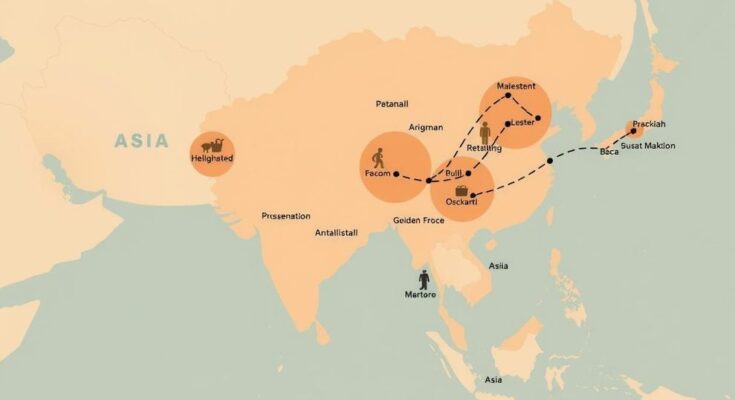The U.S. State Department revealed it made numerous offers to Thailand to resettle Uyghur men prior to their deportation back to China, where they may face significant human rights violations. Thailand’s authorities countered that no serious offers were made, highlighting the diplomatic tensions involved. Human rights groups have condemned the deportations, while China asserts its practices in Xinjiang target economic and social development, denying any wrongdoing.
Recent statements from the United States indicate that multiple offers were made to Thailand for the resettlement of over thirty Uyghur men prior to their deportation back to China. These individuals had been detained in Thailand since 2014 after escaping persecution in Xinjiang, China. The U.S. State Department condemned the deportation, fearing these individuals may face severe human rights abuses upon their return to China.
The U.S. has engaged with Thailand over the years to prevent such deportations, explicitly stating, “We have worked with Thailand for years to avoid this situation.” Conversely, Thailand’s Vice Minister for Foreign Affairs, Russ Jalichandra, claimed that no serious offers were made to take in the men, suggesting that third countries should negotiate with China regarding the resettlement.
The State Department criticized Thailand’s actions as contrary to international law, particularly the United Nations Convention Against Torture. They emphasized that the safety of individuals at risk of torture should not be subject to negotiation with a country that has a history of persecution.
Jalichandra expressed concerns over the potential repercussions from China if Thailand allowed the Uyghurs to seek asylum in another country, declaring that the country faced a “huge” impact from such actions.
Human rights organizations have condemned the deportations, asserting that these men are now at significant risk of torture and mistreatment in China, where an estimated one million individuals, including Uyghurs, are subjected to harsh conditions in re-education camps.
In response to the international outcry following past deportations, significant numbers of Uyghurs were sent back to China after similar apprehensions. The recent deportations have rekindled alarm over Thailand’s treatment of Uyghur asylum seekers, with calls from UN officials for compliance with international human rights laws.
Chinese officials have rebuffed accusations of human rights violations, asserting that their practices in Xinjiang seek to promote development and combat radicalism. They have rejected foreign criticism, indicating the issues in Xinjiang are a matter of domestic policy.
The situation surrounding the deportation of Uyghur men from Thailand to China illustrates a tense intersection of international human rights, diplomacy, and national sovereignty. Despite multiple resettlement offers, Thailand’s actions have sparked global condemnation for potential human rights violations. Furthermore, the response from both the U.S. and various NGOs emphasizes the urgent need for lawful protection of vulnerable individuals against persecution. As this unfolding situation continues, the implications for international law and human rights remain critical areas of concern.
Original Source: www.usnews.com




